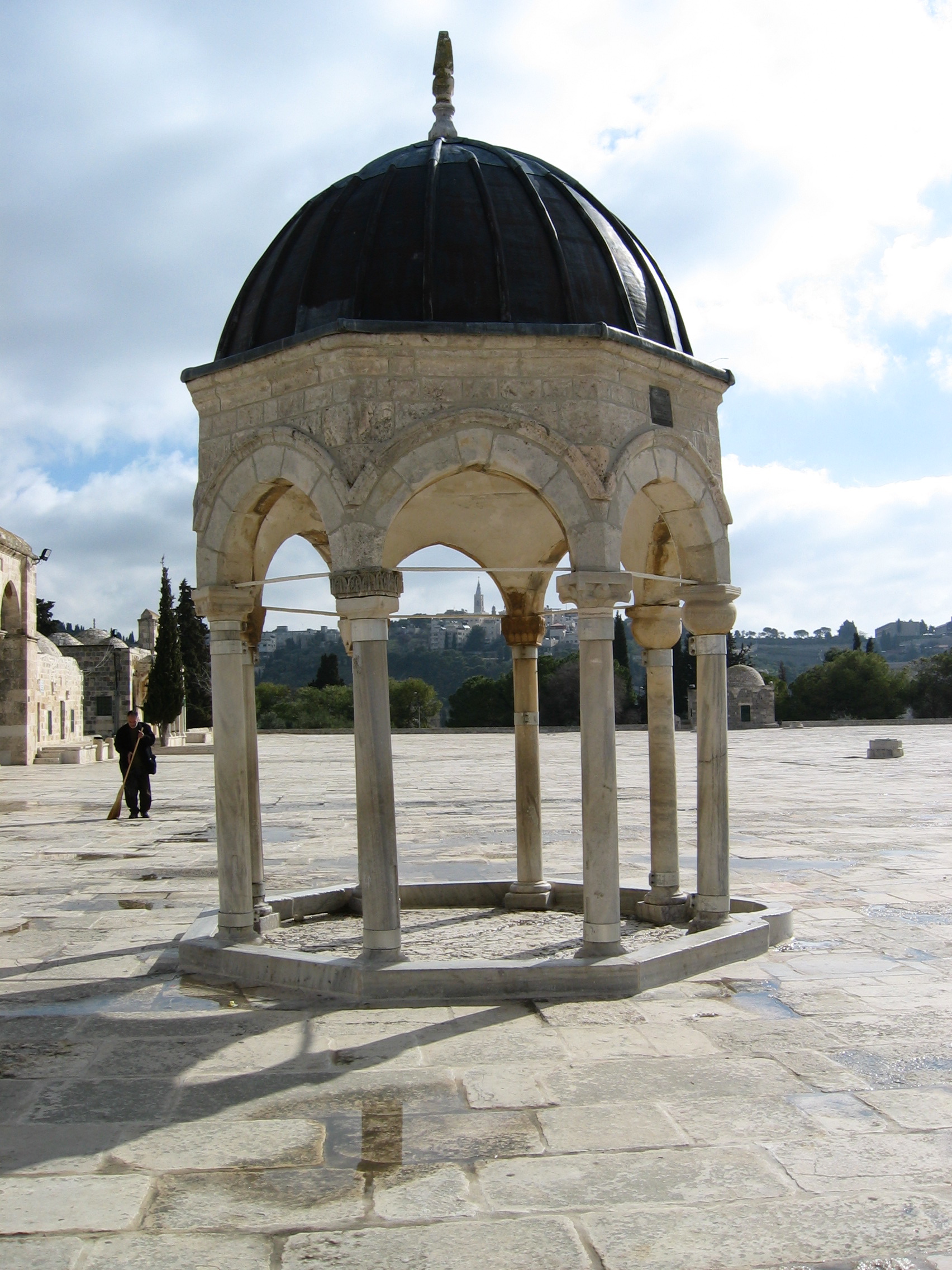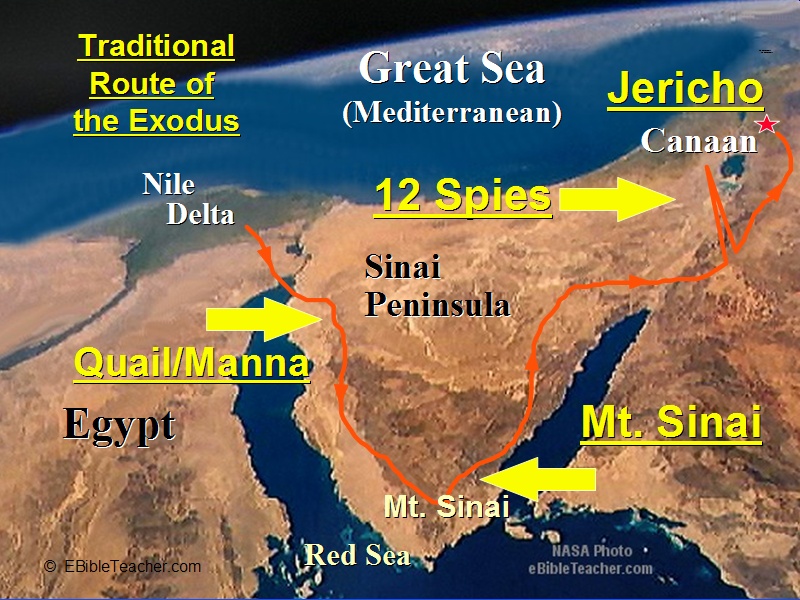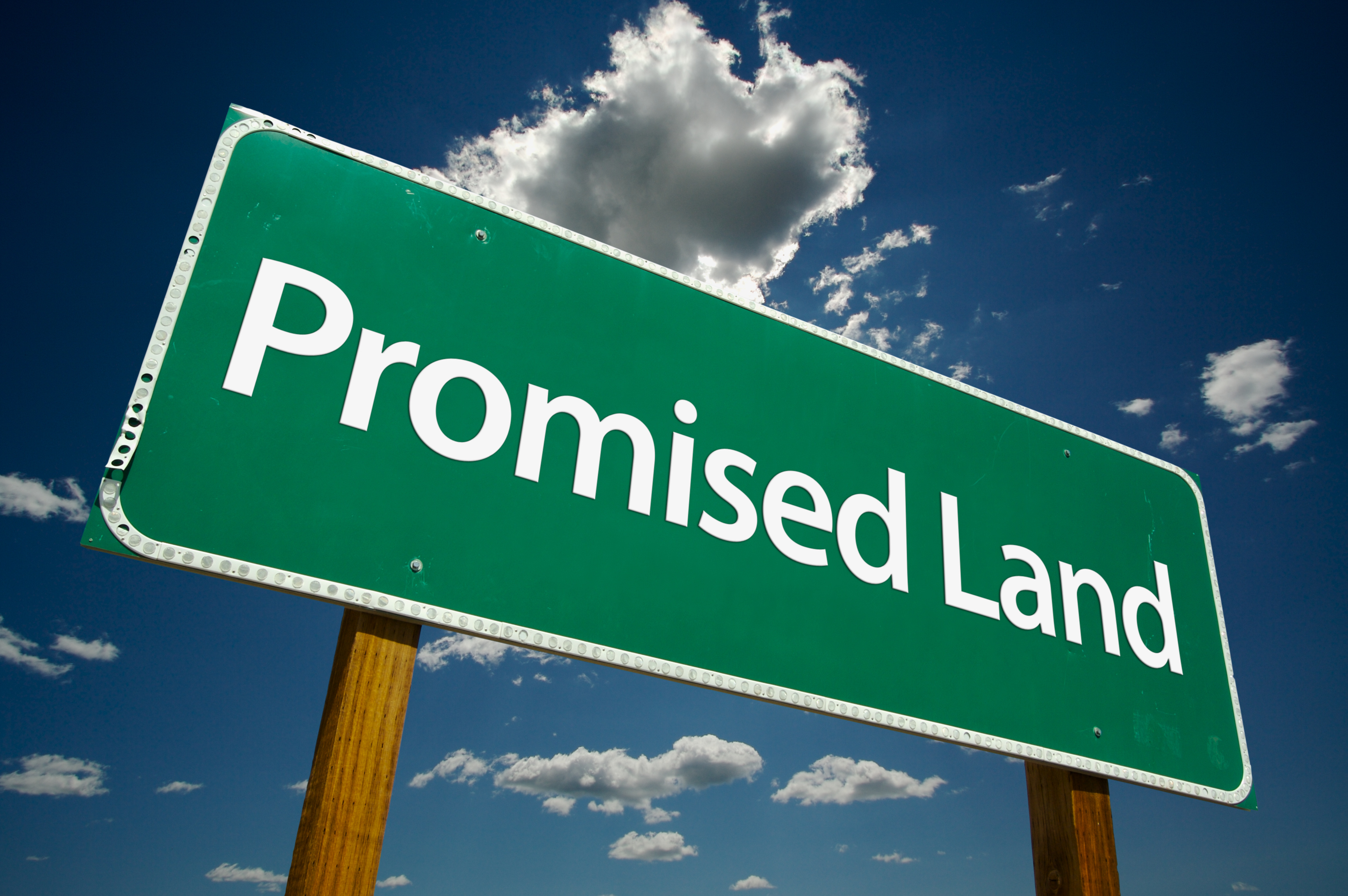Tag Archives: Promised Land
Listen to your fathers, so your ashes won’t be trampled on!

Genesis 50:11, Beyond the Jordan. Beyond is the Hebrew word eber meaning “across.” This was the roundabout way of reaching Machpelah. The Jewish and Christian commentaries I have studied don’t give a good reason for Jacob’s burial entourage taking this most indirect route to the burial cave of the patriarchs. It’s possible that Jacob was, out of faith in the promises of Elohim, prophetically tracing the steps that his descendants would take several generations later in entering the Promised Land. It’s almost as if Jacob was showing the future generations of Israelites the route he wanted them to take from Egypt to the Promised Land to fulfill biblical types and shadows.
If Jacob’s intent was to show future generations of his descendants the route to enter the Promised Land, this begs a question for us. Do you have righteous parents? How about righteous spiritual fathers—the fathers of our faith such as the biblical apostles and prophets, Yeshua himself, and, of course Moses and the patriarchs? They have laid out the route for us to take to reach the Promised Land of our spiritual inheritance—the kingdom of Elohim or heaven. Are we following this path, or have we chosen another path?
Malachi was the final prophet to close out the Old Testament or Tanakh before the coming of the promised Messiah. He uttered a strong warning to all who have ears hear and a heart to understand lest the fiery judgments of YHVH Elohim come upon you and your ashes be trampled under the feet of the righteous.
Remember the Torah-law of Moses, My servant, Which I commanded him in Horeb for all Israel, With the statutes and judgments. Behold, I will send you Elijah the prophet Before the coming of the great and dreadful day of YHVH. And he will turn The hearts of the fathers to the children, and the hearts of the children to their fathers, Lest I come and strike the earth with a curse. (Mal 4:4–6)
These are the final warning words and wise admonitions that close out the Tanakh. Let’s heed these wise words and turn our hearts back to the righteous fathers of our faith. Maybe they knew something that we don’t—the way to Elohim!
The Corpse of Jacob Shows the Way to the Promised Land?
Genesis 50:11, Beyond the Jordan. Beyond is the Hebrew word eber meaning “across.” This was the roundabout way of reaching Machpelah.
The Jewish and Christian commentaries I have studied don’t give a good reason for Jacob’s burial entourage taking this most indirect route to the burial cave of the patriarchs.
It’s possible that Jacob was, out of faith in the promises of Elohim, prophetically tracing the steps his descendants would take several generations later in entering the Promised Land. It’s almost as if Jacob was showing the future generations of Israelites the route he wanted them to take from Egypt to the Promised Land to fulfill biblical types and shadows.
Down to Egypt (or “Hell”) or Up to the Jerusalem (or “Heaven”)?
Genesis 39:1, Down to Egypt…down there.
There are more than twenty references in the Bible to “going down to Egypt,” coming “up from Egypt” or words to this gist. Egypt can be taken as a biblical metaphor for the secular world and all that is in it that is in opposition to YHVH’s paths of righteousness. Egypt represents the low spiritual way of following the world, flesh and the devil that is evil that leads to death and separation from Elohim, while the Promised land, and specifically Jerusalem, is a metaphor for the spiritual high place of truth, righteousness and godliness that leads to eternal life. This is why the Bible speaks of “going down to Egypt” and “going up to Jerusalem.”
Each person has only two choices in life on how they will conduct their lives. They must make a choice—they will make a choice purposely or inadvertently. They can choose the proverbial downward path or the highway to hell or the upward path or the highway to heaven. Everyone Continue reading
The Promised Land Inheritance Is Still an Unfulfilled Promise
Numbers 34:2, This is the land. The land of Canaan as described in this passage is but a small portion of Israel’s total land inheritance from the Creator. In the Abrahamic Covenant YHVH made to Abraham and to his descendants, this promise has yet to be fulfilled to its fullest extent (review Gen 17:8 cp. 15:18). Never in Israel’s long history as a nation has it possessed and inhabited the land from Egypt to Iraq.
If YHVH’s promise hasn’t been fulfilled yet, unless he lied to Abraham and the Word of Elohim can’t be trusted, this promise is yet to be fulfilled.
In Ephesians 2:12, Paul mentions “covenants of promise” (plural). Most redeemed believers have heard of the New Covenant and know that it somehow relates to them, but Paul speaks of covenants (plural) with regard to the one-new man believer in Yeshua (read the next few verses for context).
Other than the New Covenant (singular), what other covenants (plural) that YHVH made with the nation Israel might Paul be referring to? The Abrahamic Covenant, of course.
Do you see yourself as a son of Abraham and an inheritor of these promises? (See Rom 4:16; 9:8–11; Gal 3:7, 9; 14, 28–29.) Paul did. What was Paul thinking, how does this affect you and your future, and how does this square with what the church typically teaches is the future inheritance of the saints?
Down to Egypt (Hell) or Up to the Promised Land (Heaven)?
Genesis 39:1, Down to Egypt…down there. There are more than twenty references in the Bible to “going down to Egypt,” coming “up from Egypt” or words to this gist. Egypt can be taken as a biblical metaphor for the secular world and all that is in it that is in opposition to YHVH’s paths of righteousness. Egypt represents the low spiritual way of following the world, flesh and the devil that is evil that leads to death and separation from Elohim, while the Promised land, and specifically Jerusalem, is a metaphor for the spiritual high place of truth, righteousness and godliness that leads to eternal life. This is why the Bible speaks of “going down to Egypt” and “going up to Jerusalem.”
Each person has only two choices in life on how they will conduct their lives. They must make a choice—they will make a choice purposely or inadvertently. They can choose the proverbial downward path or the highway to hell or the upward path or the highway to heaven. Everyone chooses one path or another, even if they are not aware of the conscious decision to do so. To not make a choice is, by default, to choose the downward path.
Most people are somewhere in the middle, which is a vast grey area. They neither choose one path or the other. They choose just enough of the upward path to alleviate their guilt, but not enough of it to radically change their lifestyles. They still want enough of the downward path to satiate the lust of the flesh, the lust of the eyes and pride of life.
So what did Yeshua have to say about those who choose this wide, well-traveled middle road?
I know your works, that you are neither cold nor hot. I could wish you were cold or hot. So then, because you are lukewarm, and neither cold nor hot, I will vomit you out of My mouth. (Rev 3:15–16)
To those who find themselves on this path, Yeshua is standing outside of the door of their spiritual house and saying,
Behold, I stand at the door and knock. If anyone hears My voice and opens the door, I will come in to him and dine with him, and he with Me. (Rev 3:20)
To those who respond positively to his invitation, he promises them a place in the Promised Land of his everlasting kingdom.
To him who overcomes I will grant to sit with Me on My throne, as I also overcame and sat down with My Father on His throne. (Rev 3:21)
Are you going up to Beth-El (the House of El)?

The Temple Mount or the House of El (Hebrew: Beth-El), and the likely spot where the Temple of Solomon stood, and the possible site of the actual holy of holies.
Genesis 35:1–15, Go up to Bethel. Jacob, twenty years earlier, had left Canaan in disgrace fleeing eastward into exile (as his descendants would do generations later), where in captivity to Laban he pays the price for being a deceiver.
In captivity, Jacob prospers and finally is able to return to the Promised Land.
En route westward back to Canaan, he goes through a wilderness experience, as the children of his namesake would do several generations later.
What type of individuals does YHVH not permit and permit to enter into the Land of Promise? The answers are in Hebrews 4:1–11 where the writer speaks of doubt and unbelief, faith, hardness of heart versus resting in YHVH and not in the works of our flesh. (Read it.)
To come home, like the prodigal son, to the home of his earthly parents and to that of his Heavenly Father (Beth-el or House of El) what was required of Jacob? He had to manifest brokenness, humility, a new identity, repentance, and make restitution for past sins committed against others (Gen 34).
Will YHVH similarly break our stiff necks, refine and purify us to become suitable for the Master’s use in his spiritual house? Are you fighting the process that YHVH is working in your life to prepare you for your spiritual Bethel?
Jacob got hit again and again until his carnal will was finally broken, his heart was circumcised and he died to the willfulness of his flesh and scheming to bring YHVH’s will to pass in his life. (Have other notable personages of Scripture tried the same things and had their will broken before they were useful to YHVH? Remember Moses when he murdered the Egyptian? What did YHVH do with him for 40 years?)
Remember, neither the uncircumcised in heart nor flesh will enter into the spiritual house of Elohim (Ezek 44:9), which is the ultimate Promised Land.
Where are you in this spiritual process?
The Promised Land belongs to those (i.e. the seed of Jacob) who pass the wilderness tests of YHVH (Gen 35:12).
Who is that seed? (Read Rom 4:16; 9:8, 11; Gal 3:7, 9, 14, 28, 29.)
Are we not following exactly in our father Jacob’s footsteps leaving our exile and captivity in Babylon (false religious systems, which contains a mixture of both good and evil, see Rev 18:4), returning westward across the Jordan into the land of Promise, to our spiritual inheritance, to the ancient and good paths of the Torah faith (Jer 6:16, 19), which is defined in terms of YHVH’s covenants with Israel (Eph 2:12–14)? Is not YHVH calling out a growing remnant of believers in Yeshua to do just that in our time? Do you see that Jacob’s life is a prophetic road map of what each individual believer must go through to obtain his spiritual inheritance? His life is a prophetic picture of what all Israel, collectively, must go through, as well.





